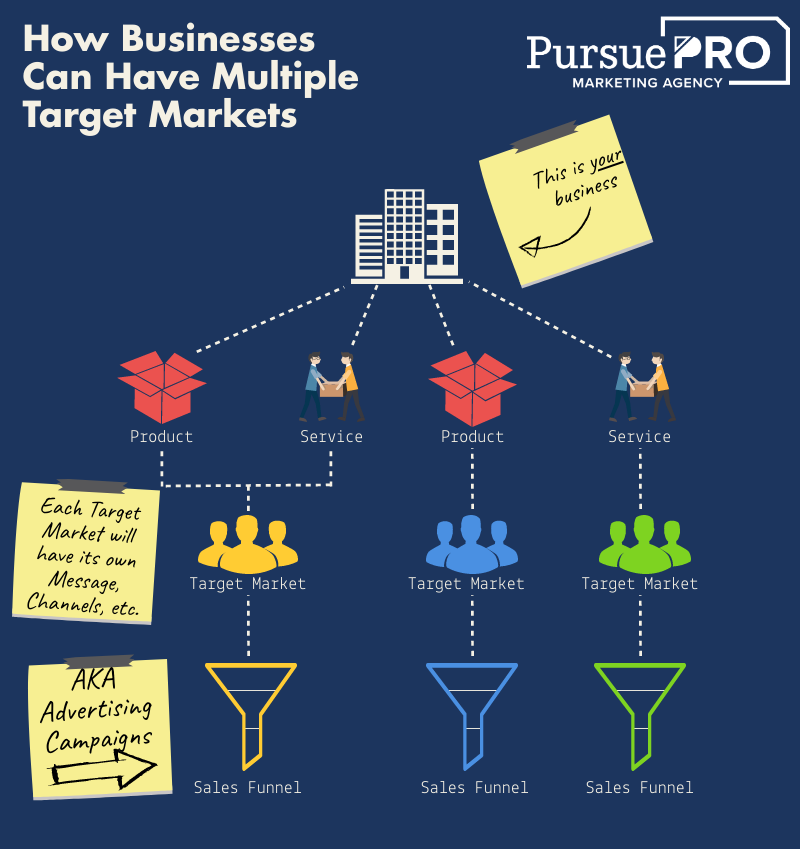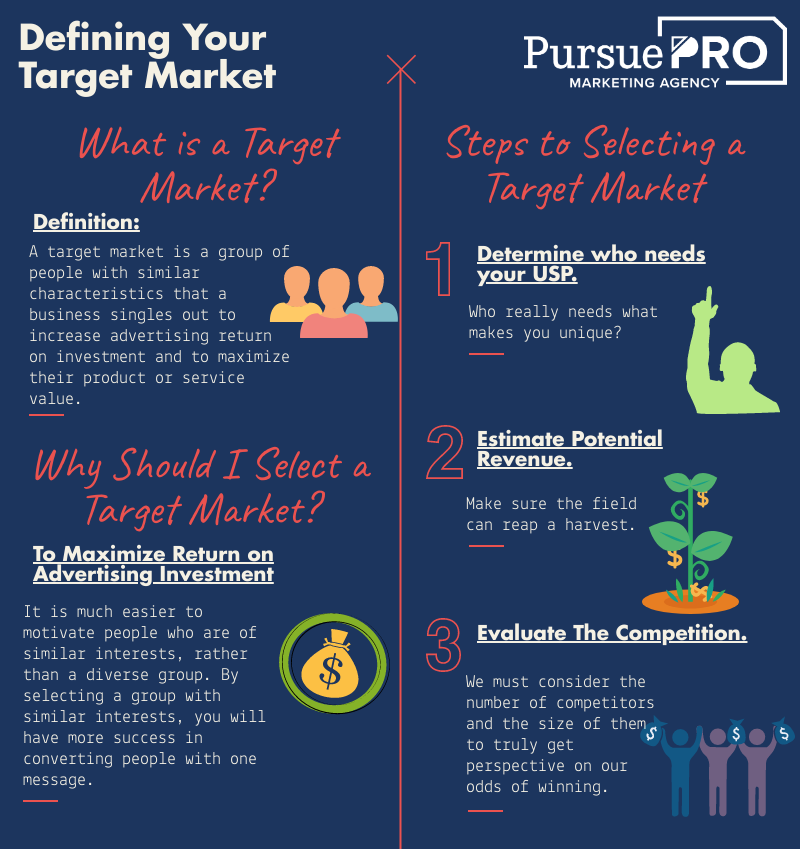How to define your Target Market

Often considered one of the more difficult decisions you will face in positioning your business, small businesses and entrepreneurs usually struggle in defining their target market.
It can be a confusing bitter process because people don’t fully understand why it is important to focus on a fraction of the market. There are some small business owners that choose to ignore the concept of a target marketing, and claim that their product or service is for everyone. The small businesses that choose this route usually get stuck competing on price, coping with small returns on advertising investments, and ultimately struggle to keep their business alive. By narrowing your advertising focus you can more effectively motivate people to buy your product or service.
What is a Target Market?
- Target Market Definition:
- A target market is a group of people with similar characteristics that a business singles out to increase advertising return on investment and to maximize their product or service value.
Target markets are often clustered by a shared characteristic that gives the business an advantage to motivate them to buy. These characteristics can be in the form of:
Why should you pick a target market for your business?
When running a business it is common to have a limiting budget that can be spent on bringing in new sales. The question that every company needs to answer is, “How do we maximize our return on advertising investments (ROAI)?” One of the most effective answers to this question is to narrow your advertising efforts to focus on a target market. Advertising itself is only a form of communicating a message to the outside world, for the benefit of your business. The most common end goal of conveying a message to the outside world is to simply increase your sales; therefore, your message needs to motivate your consumer to consume your product. So the question we need to answer is, “How do you motivate the consumer to consume?” Your answer to this question will depend on who you are trying to convince to buy your product or service. It is much easier to motivate people who are of similar interests, rather than a diverse group. By selecting a group with similar interests, you will have more success in converting people with one message. Another reason it is important to select a target market is because it will force you to guarantee that there is a need for your product or service. When creating your products or services it is important that they are filling the specific needs of a specific target market. This allows you to leverage the value your product creates to compete on more than just price. If you can fill the complete set of needs for a specific target market, you can create more value than if you fill a small portion needs for everyone. Create the amount of value that motivates to buy, not just the amount of value that gets people to notice you.
Can my business have more than one target market?
The short answer is yes. Your business can have many target markets. Some businesses offer multiple products/services that cater to different target markets. Also common, businesses will create multiple advertising campaigns that cater to different target markets, all for the same product or service.
There are many ways to strategize which target markets you should go after. Some businesses will diversify to reduce risk. Some businesses will go after target markets that are similar to reduce costs and complexity. There is no right answer for all scenarios, and each company needs to put the work and thought into what is the right combination of target markets for them.
The bottom line you need to remember is you need to single out one target market for each advertising campaign. Additionally, you need to have a developed strategic marketing plan for each target market.

How to select target market(s) for my business?
The most practical way to select a target market is to follow a SWOT analysis approach. SWOT stands for strengths, weaknesses, opportunities, and threats. We must tweak the SWOT approach to make it a more practical evaluation in selecting our target market. To do this, I simplified the approach to keep everything easy to understand and realistic. 3 steps to selecting your Target Market:

Determining who needs your USP
If you have not already defined your Unique Selling Proposition (USP) for your business and/or products or services, do that first. Once you have your USP defined it is time to figure out who really needs what makes you unique. To read more about how to select your USP, click here. Your unique selling proposition is the secret sauce that a certain group of people can’t resist. If you can find the right group of people that need your USP, all your marketing efforts will produce much better results. Start your search by choosing the characteristics of people that would be attracted to your USP. Use the type of characteristics I listed earlier to help you form your list. Once you have your list of characteristics, now is the time to pull them together and identify the group of people that possess most of those characteristics. If you can find that group, you have the basic building blocks of your target market.
Estimate Potential Revenue from that Target Market.
Make sure the field can reap a harvest. Before selecting your target market you must estimate the potential revenue that can be obtained through a specific target market. You need to take into account that your target market has to have enough monetary potential to support the investments in that area. Real revenue potential for certain target markets may be surprising, and an experienced professional would not make a decision without first researching those numbers. You can make it a very complex calculation if desired, but even a simple equation to evaluate potential revenue is better than not taking it into consideration at all.
Evaluate your Competition for the Target Market.
After estimating the potential revenue, it is vital to consider the competition you will be up against. If the potential revenue you calculated was more than exciting, just calm yourself until you take into account the competitors. Much like life, we must consider the number of competitors and the size of them to truly get perspective on our odds of winning. Put some effort into compiling a list of the competitors and their size. Next calculate the amount of market share left over for you to feast on in a realistic sense. This will help you make the final decision on which target market is best for you. When you have finished all 3 steps of the process, it is now time to select your target market. Sometimes all the research can leave you more skeptical than before you started this process. Don’t let the worries get you stuck, and simply make the most logical decision you can based on the information at your fingertips. Selecting a target market is a big decision for your strategic positioning of your business, but without one you could greatly reduce the return on investment of your advertising campaigns.
Our company name Pursue Pro was inspired by the idea of individuals pursuing professionalism through their marketing efforts, and continually aspiring to be the pro in their field.

Article written by Jacob Hirschman
